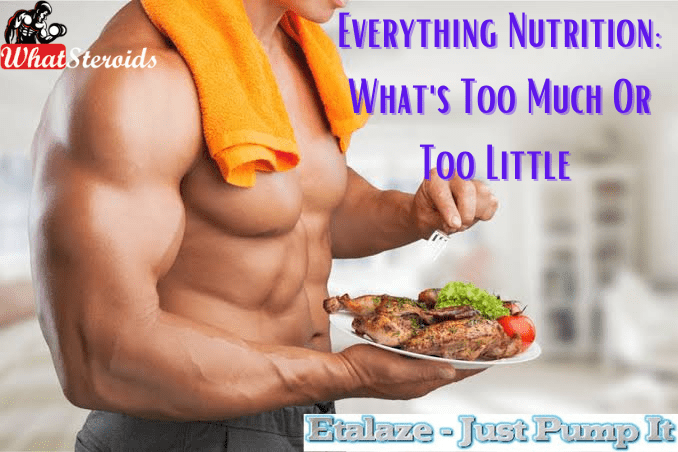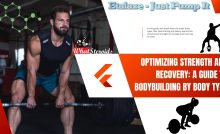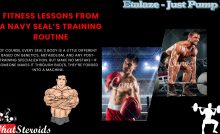Everything Nutritional Food: What’s Too Much Or Too Little


When it comes to bodybuilding, overeating can result in consuming too many calories and potentially gaining weight, which may not be ideal for muscle building. Therefore, it is crucial to maintain a balanced and personalized nutrition plan that aligns with your specific goals. By that we're talking about nutritional food every bodybuilder must stick to.
Consuming more calories than your body needs for muscle growth can lead to fat gain. Similarly, not eating enough food can hinder muscle development. It's crucial to calculate your calorie and macronutrient needs based on your goals and activity level and consult with a fitness or nutrition professional for personalised guidance.
How to Measure Calories to Ensure Nutritional Food as a Bodybuilder
As a bodybuilder, accurately measuring calorie intake is crucial for your nutrition plan. Here are some steps to help you count calories in your food:
Use a Food Scale
Invest in a digital kitchen scale to weigh your food. This allows you to measure portions accurately.
Read Nutrition Labels
Many packaged foods have nutrition labels that provide calorie information per serving. Pay attention to serving sizes and servings per container.
Use Calorie Tracking Apps
Many smartphone apps like MyFitnessPal and Cronometer make it easy to track your calorie intake. You can search for the foods you're eating and specify the portion size, and the app will calculate the calories.
Reference Online Databases
If you can't find a nutrition label, you can often find calorie information for various foods in online databases and reference books.
Learn to Estimate
Over time, you'll better estimate portion sizes and calorie content. This skill is valuable when you can't weigh or measure every meal.
Consider Macronutrients
While tracking calories, don't forget to pay attention to your macronutrient intake (proteins, carbs, fats). These are also crucial for bodybuilders.
Be Consistent
It's essential to be consistent in tracking. Measure and record your food every day to get a better understanding of your calorie intake.
Adjust for Cooking
Remember that cooking can change food weight (due to water loss). Weigh food before cooking for more accurate calorie tracking.
Consult a Nutritionist
If you're unsure about your calorie needs or struggle with tracking, consider consulting a registered dietitian or nutritionist who can help you create a personalised nutrition plan.
Related Article: 30 Gym Slang Terms Explained
Measuring and tracking calories accurately is an essential part of bodybuilding, as it helps you control your intake and adjust your diet to meet your specific goals.
Nutritional Food You Must Include In Your Diet
To effectively build muscle mass, it's essential to maintain a balanced diet consisting of nutrient-rich foods. Here are some foods that are best for building muscle:
1. Lean Proteins
Protein is essential for muscle growth. Opt for lean sources like chicken, turkey, fish, lean beef, tofu, tempeh, eggs, and low-fat dairy products. Plant-based sources like beans, lentils, and quinoa are also excellent options.
2. Complex Carbohydrates
Carbohydrates provide energy for workouts and recovery. Choose complex carbs like whole grains (brown rice, quinoa, oats), sweet potatoes, and whole-wheat pasta.
3. Healthy Fats
Good fats are essential for overall health. Include sources like avocados, nuts, seeds, and olive oil.
4. Dairy or Dairy Alternatives
Dairy products and dairy alternatives like almond milk or soy milk can provide additional protein and calcium.
5. Fruits and Vegetables
These are rich in vitamins, minerals, and antioxidants, which support overall health and recovery.
6. Nuts and Seeds
Almonds, walnuts, chia seeds, and flaxseeds are excellent sources of healthy fats and protein.
7. Greek Yogurt
It's high in protein and can be a good snack or breakfast option.
8. Salmon
Rich in omega-3 fatty acids and high-quality protein, salmon can support muscle growth and overall health.
9. Quinoa
A complete protein source and a great alternative to rice or pasta.
10. Beans and Lentils
These are excellent sources of plant-based protein and fibre.
11. Whey Protein
A convenient way to supplement your protein intake, especially post-workout.
12. Eggs
Eggs are a highly bioavailable source of protein and contain essential amino acids.
13. Lean Beef
It provides high-quality protein, iron, and essential nutrients.
14. Chicken or Turkey Breast
Lean poultry is a staple for many bodybuilders due to its protein content and low-fat
15. Tofu and Tempeh
Good plant-based protein sources, especially for vegetarians and vegans.
16. Cottage Cheese
It's high in protein and low in fat, making it a great addition to your diet.
A well-balanced diet is vital. Ensure you consume enough calories to support muscle growth and consider your macronutrient balance. Staying hydrated is also essential. You might need to adjust your calorie and protein intake based on your goals, activity level, and body size, so it's a good idea to consult a nutritionist or dietitian for a personalised plan.
Should Bodybuilders Avoid Some Not-So- Nutritional Food Altogether?
While there are no foods that bodybuilders must avoid, some foods are less ideal due to their potential negative impact on health and fitness goals. These include:
Read More: Meet the World’s Strongest Grannies
Processed Foods
Highly processed foods are often high in empty calories, added sugars, unhealthy fats, and low in nutrients. They can contribute to weight gain and hinder muscle-building efforts.
Sugary Snacks and Beverages
Foods and drinks with excessive added sugars can lead to energy spikes and crashes, as well as weight gain. They offer little nutritional value.
Trans Fats
Foods containing trans fats, such as many fast-food items and some packaged baked goods, are linked to heart disease and should be limited
Sugary Cereals
Many breakfast cereals contain added sugars and lack essential nutrients. Opt for whole-grain, low-sugar options instead.
Alcohol
Excessive alcohol consumption can impair muscle recovery and protein synthesis. It can also contribute to dehydration and poor dietary choices.
Excessive Fast Food
While an occasional indulgence is acceptable, relying on fast food for a significant portion of your diet can lead to poor nutrition and hinder muscle gains.
Highly Caffeinated or Sugary Energy Drinks
These may provide a temporary energy boost, but the sugar and caffeine content can harm health and lead to crashes.
Fried Foods
Fried foods often contain unhealthy fats and calories. While occasional consumption is acceptable, they shouldn't be a regular part of your diet.
Excessive Saturated Fats
Limit foods high in saturated fats, like fatty cuts of red meat and full-fat dairy products. While some saturated fats are okay, too much can harm heart health.
Excessive Salt
High-sodium foods can lead to water retention and may negatively affect blood pressure. Limit processed foods and opt for fresh, whole foods.
It's essential to maintain balance and moderation in your diet. Occasional indulgences are OK, but your primary focus should be on nutrient-dense, whole foods that support your muscle-building and overall health goals. Consulting with a nutritionist or dietitian can help you create a personalised diet plan that aligns with your objectives.
Sea Food to Consider for Gains
Seafood is a healthy and delicious choice, rich in protein, omega-3 fatty acids, and various essential nutrients. Here are some healthy seafood options and basic preparation methods:
Salmon:
-
- Grilled: Season with herbs, spices, and a bit of olive oil, then grill until it flakes easily.
- Baked: Marinate with lemon, herbs, and olive oil, then bake in the oven.
- Pan-Seared: Sear in a hot skillet with a little oil, skin side down, until crispy, then finish in the oven.
-
Tuna:
- Sushi/Sashimi: Serve raw as sashimi or in sushi rolls.
- Grilled or Broiled: Season with soy sauce, ginger, and garlic, then grill or broil until desired doneness.
-
Shrimp:
- Shrimp Scampi: Sauté in garlic, butter, and white wine.
- Grilled: Thread onto skewers and grill with marinade or spices.
-
Cod:
- Baked: Coat with breadcrumbs and herbs, then bake until it flakes easily.
- Poached: Simmer in seasoned broth or white wine until opaque.
-
Mackerel:
- Pan-Fried: Coat with a light breading, then pan-fry until crispy.
- Smoked: Serve smoked mackerel with crackers and cream cheese.
-
Sardines:
- Canned: Eat canned sardines with olive oil, lemon, and crackers or on top of a salad.
- Grilled: Season and grill sardines with olive oil until they're crisp and fragrant.
-
Trout:
- Stuffed: Stuff with herbs, lemon, and garlic, then bake or grill.
- Almondine: Sauté with butter, lemon juice, and toasted almonds.
-
Haddock:
- Baked: Season with herbs and breadcrumbs, then bake until tender.
- Poached: Poach in a flavorful broth or white wine.
-
Scallops:
- Pan-Seared: Sear in a hot pan with butter or oil for a few minutes on each side.
- Broiled: Season and broil until lightly browned and opaque.
When preparing seafood, remember to handle it safely and avoid overcooking, as seafood tends to become dry when overdone. You can customize these cooking methods with various herbs, spices, and sauces to suit your taste preferences. Additionally, be mindful of sustainable seafood choices and check for local advisories on fish consumption, especially for pregnant women and children, due to potential mercury content.
Must Read: Using SARMs on Top of a Steroid Cycle: DOs and DON
Proper Storage of Food to Keep It Fresh
-
Refrigeration:
- Keep perishable items like meat, dairy, and leftovers in the refrigerator at or below 40°F (4°C).
- Store raw meat separately to prevent cross-contamination.
- Use airtight containers or food storage bags to seal items to prevent moisture loss and odors from spreading.
-
Freezing:
- Freeze items at 0°F (-18°C) or lower for long-term storage.
- Use freezer-safe containers or vacuum-sealed bags to prevent freezer burn.
- Label items with the date to keep track of storage time.
-
Pantry:
- Store dry goods like pasta, rice, and canned foods in a cool, dry place away from direct sunlight.
- Use airtight containers to keep pests out and maintain freshness.
-
Fruits and Vegetables:
- Some fruits and vegetables should be stored separately due to ethylene gas production (e.g., apples and avocados).
- Check for specific requirements for each item, as some should be stored in the fridge, while others are better at room temperature.
-
Keep an Eye on Expiration Dates:
- Regularly check expiration dates on packaged foods and discard items that have passed their date.
-
Properly Seal Containers:
- Ensure containers are tightly sealed to prevent moisture and air from entering, which can lead to spoilage.
-
FIFO (First In, First Out):
- Practice the "first in, first out" method to use older items before newer ones to avoid food waste.
-
Handle Leftovers:
- Refrigerate or freeze leftovers promptly, and use them within a reasonable time frame.
-
Be Mindful of Temperature Zones:
- Know the temperature zones in your fridge (e.g., coldest at the back and warmest on the door) and store items accordingly.
-
Regularly Clean Your Storage Areas:
- Clean your refrigerator, pantry, and cabinets to prevent the growth of bacteria and mold.
Remember that specific foods may have unique storage requirements, so it's important to check packaging labels and do some research when in doubt. Proper food storage helps maintain freshness and reduces food waste.
Packing Your Food Discretely to Eat at the Gym
- Choose the right container: Opt for containers that are compact and easy to carry, like a small Tupperware or a bento box.
- Select inconspicuous foods: Choose foods that are quiet to eat and won't disturb others. Avoid noisy snacks like chips.
- Pack pre-portioned snacks: Prepare single servings of your snacks to avoid rustling around in a noisy bag or container.
- Use noise-reducing wrappers: Wrap your snacks in noise-dampening materials, like cloth napkins or silicone food wraps, to reduce crinkling sounds.
- Opt for quieter options: Consider snacks like protein bars, pre-cut fruit, or a smoothie in a shaker bottle, which are less likely to make noise.
- Be mindful of odors: Choose foods that won't emit strong odors in the gym. Stick to odorless options like nuts, dried fruit, or yogurt.
- Pack a reusable water bottle: Bring a reusable, non-disruptive water bottle to stay hydrated without making noise with plastic crinkling.
Remember to be respectful of others in the gym and maintain good hygiene when consuming your discreetly packed food.
Going for a Jog and Want to Snack In Between?
Snacking while jogging can be tricky, as it's important to maintain focus on your run and safety. If you need a quick energy boost, consider portable, easy-to-eat options like energy gels or chews that can be consumed with minimal interruption.
Just make sure to dispose of the packaging responsibly. Hydration is often more critical than snacking during a run, so prioritize water or a sports drink for longer workout.
It's best to consume easily digestible snacks that provide a quick energy boost. Some good options include energy gels, granola bars, banana slices, or a handful of raisins.
When running or jogging, it's important to consume snacks that provide a quick energy boost and are easy to carry. Some good options include:
- Energy gels or chews: These are specifically designed for quick energy replenishment during exercise.
- Bananas: They're portable, rich in carbohydrates, and contain potassium.
- Trail mix: A mix of nuts, seeds, and dried fruits can provide a good balance of nutrients.
- Nut butter packets: Portable and packed with healthy fats and protein.
- Rice cakes or rice bars: A lightweight, easy-to-carry option with carbohydrates.
- Fig bars: These provide a blend of carbohydrates and are easy to eat on the go.
You can always experiment to find what works best for your body and your preferences while running.
Tips to Prepare a healthy Balanced Nutritional Food
Preparing a healthy, balanced meal as a bodybuilder involves selecting the right components in the proper proportions. Here are steps to help you prepare such a meal:
1. Choose a Lean Protein Source
Start with a lean protein source such as chicken, turkey, fish, lean beef, tofu, or beans. Protein is crucial for muscle growth and repair.
2. Add Complex Carbohydrates
Incorporate complex carbohydrates like brown rice, quinoa, sweet potatoes, or whole-wheat pasta. Carbs provide energy for your workouts and help replenish glycogen stores.
3. Include Vegetables
Vegetables are rich in vitamins, minerals, and fibre. Opt for various colourful options, like broccoli, spinach, bell peppers, and carrots.
4. Incorporate Healthy Fats
Include sources of healthy fats like avocados, nuts, seeds, or olive oil. Fats are essential for overall health and hormone production.
5. Measure Portions
Use a food scale to measure and control your portion sizes. Balancing your macros (protein, carbs, and fats) is essential.
6. Season and Flavor
Use herbs, spices, and low-sodium sauces to add flavour to your meal without excess calories or sodium.
7. Hydrate
Don't forget to drink water. Staying hydrated is essential for overall health and muscle function.
8. Preparation Methods for Nutritional Food
Opt for healthy cooking methods like grilling, baking, steaming, or sautéing with minimal oil. Avoid deep-frying.
9. Post-Workout Nutrition
After a workout, consider a post-workout meal or shake that combines protein and carbohydrates to support muscle recovery and replenish glycogen stores.
10. Plan
Meal planning and preparation in advance can help you stick to your nutrition goals. Cook larger batches and store leftovers for future meals.
11. Monitor Progress
Keep track of your dietary intake and how it affects your body and performance. Adjust your meal plan as needed to meet your goals.
12. Consult a Nutritionist
If you're unsure about portion sizes, macros, or specific dietary needs, consult a nutritionist or dietitian who can create a customised nutrition plan.
It's important to customize your meals to your individual goals, activity level, and dietary preferences as everyone's nutritional needs vary. Consistency in healthy eating, combined with a well-structured workout plan, will contribute to success in bodybuilding.
Best Calorie-Measuring Equipment and Machines
For bodybuilders and fitness enthusiasts looking to accurately measure calorie intake, various kitchen appliances and gadgets can be helpful. Here are some of the best calorie-measuring machines and tools:
Digital Kitchen Scale
A high-quality digital kitchen scale is essential for measuring the weight of food items accurately. It allows you to calculate calories based on portion size.
Nutrition Scale
Some kitchen scales have built-in nutritional information databases. You can input the food item's code or name, and the scale calculates the nutritional content, including calories.
Smartphone Apps
There are several smartphone apps, such as MyFitnessPal and Cronometer, that allow you to track your calorie intake by searching for foods and specifying portion sizes. These apps often have extensive food databases.
Food Processors with Nutrition Calculators
Some food processors have built-in nutrition calculators that provide information about the calories, macronutrients, and other nutritional content of your recipes.
Smart Kitchen Gadgets
Various smart appliances, like intelligent blenders and air fryers, may have built-in nutrition tracking features. They can provide approximate nutritional information for your recipes.
Handheld Calorie Counters
These portable devices are designed precisely to calculate the nutritional content of food. You input the food item or scan its barcode, and the device provides calorie information.
Online Recipe Analyzers
There are websites and software tools that allow you to input the ingredients and quantities of your recipes, and they will calculate the nutritional content, including calories.
Meal Prep Containers
While not a machine per se, having portion-controlled meal prep containers can help you estimate and control calorie intake by pre-measuring your meals.
When it comes to measuring calories, choosing the right tool depends on your preferences and requirements. Digital kitchen scales are essential for precise portion control, while smartphone apps offer convenience and access to extensive databases. Consider your budget, the features you need, and your level of tech-savviness before selecting the appropriate calorie-measuring machine to help you achieve your bodybuilding goals.
Why Bodybuilders Must Eat Healthy Before a Competition
Bodybuilders must eat healthy before a competition for several important reasons:
1. Optimal Performance
Eating a nutritious diet before a competition ensures your body is fueled and ready to perform at its best. Nutrient-dense foods provide the energy required for intense workouts and help maintain strength and stamina during the competition.
2. Muscle Preservation
Proper nutrition helps preserve lean muscle mass. In the weeks leading up to competition, bodybuilders often go through a cutting phase to reduce body fat. Eating a balanced diet with adequate protein helps prevent muscle loss while shedding excess fat.
3. Nutrient Timing
The timing of meals and nutrient intake is crucial. Bodybuilders typically follow a precise nutrition plan leading up to competition, including carb-loading to maximise muscle glycogen stores and protein intake to support muscle repair and growth.
4. Recovery
Nutritional food aids in recovery between workouts. Intense training sessions can lead to muscle damage, and consuming the proper nutrients helps speed recovery and reduce the risk of overtraining.
5. Aesthetics
The appearance of bodybuilders on stage is highly dependent on their diet. The right balance of macronutrients, proper hydration, and avoiding foods that cause bloating or water retention contribute to a more chiselled and defined physique.
6. Mental Focus
Nutrition affects mental clarity and focus. Eating a healthy diet before a competition can help bodybuilders stay mentally sharp, making it easier to follow their routines and perform their best.
7. Digestive Comfort
Avoiding foods that can cause digestive discomfort, such as excessive fibre or spicy foods, is crucial to prevent gastrointestinal issues during the competition.
8. Hydration
Proper hydration is vital for overall health and performance. Dehydration can lead to muscle cramps, fatigue, and decreased athletic performance.
9. Body Composition
Following a clean, balanced diet helps bodybuilders reach their target body composition with minimal fat and maximum muscle definition, which is essential for success on stage.
Conclusion
To sum up, maintaining a healthy diet is extremely important for various reasons such as enhancing physical performance, preserving muscles, quick recovery, improving appearance, increasing mental focus and achieving overall success. Bodybuilders meticulously plan their diets not only to ensure they are in top condition for competition day but also to maintain optimal physical fitness.
Also Read: Running and Bodybuilding: Is it a Good Idea to Mix Them?
Recent Posts
Optimizing Strength and Recovery: A Guide to Bodybuilding by Body Type
Every body tells a different story—and in bodybuilding, honoring that story is the key to…
Fitness Lessons from A Navy Seal’s Training Routine
Navy SEAL training is designed to forge elite tactical athletes. It’s not your average gym…
Exploring BPC-157 Healing Properties
BPC-157 is a synthetic peptide derived from a protein found in the stomach, known for…
The Ultimate Guide to Foods That Support Hormonal Balance for Bodybuilders
Hormonal balance is crucial for bodybuilders aiming to maximize muscle growth, recovery, and overall health.…
Steroid Shops Review
osgear.se Reviews ⭐⭐⭐⭐⭐ Score: 97.78% Osgear has consistently maintained a 99% customer satisfaction rate across key…
ACE-031: A Powerful Myostatin Inhibitor
ACE-031 is a synthetic peptide designed to block myostatin, a natural regulator of muscle growth.…



